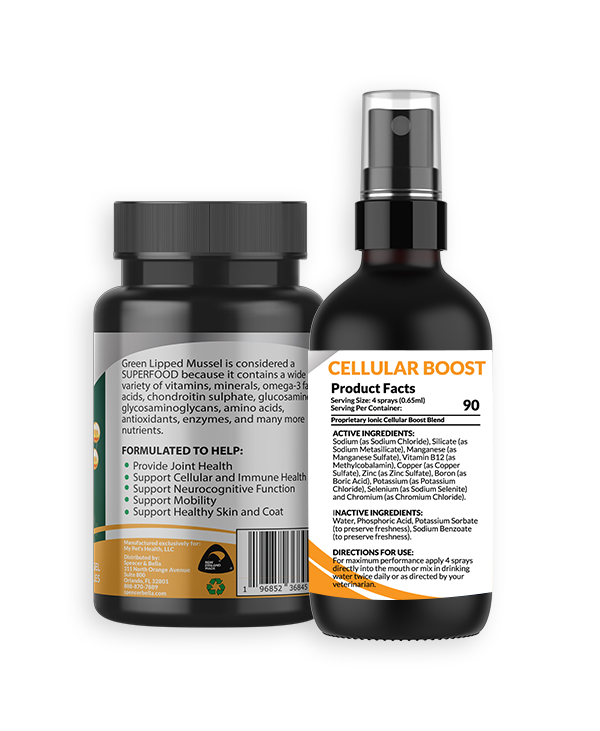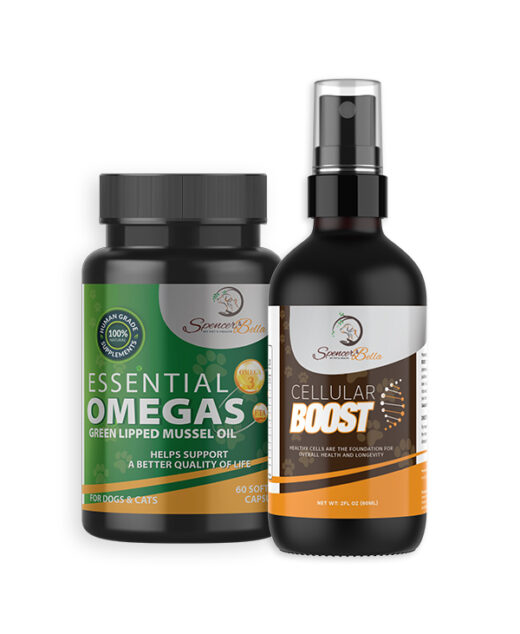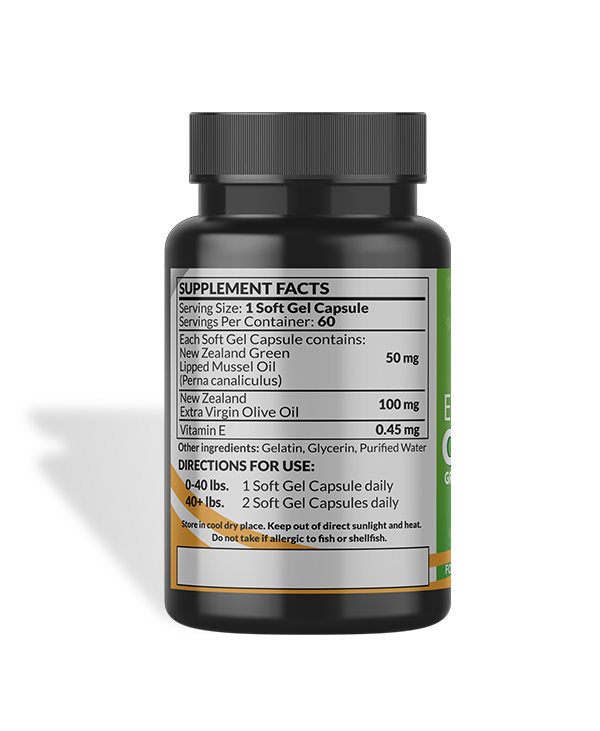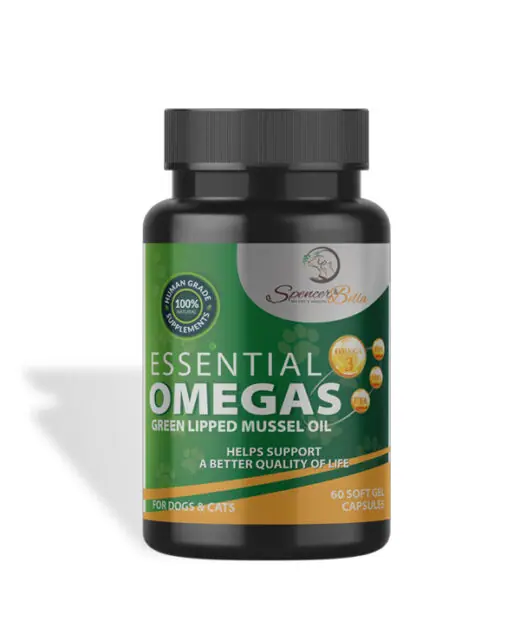All the buzz with pet health right now is centered on gut health. We can relate to that because for the past several years we have been hearing how important gut health is to humans. It’s only natural that the subject would now gravitate toward our pets. Some common symptoms of poor dogs gut health include gastrointestinal issues like diarrhea, vomiting, bloating, or constipation, fatigue and/or lethargy, and frequent licking of the paws, limbs, or other areas of the body.
I’m happy to report that I’ve had very few instances of either diarrhea or vomiting in the past 15 years with my dogs. Each of those episodes can be attributed to something they ate that they shouldn’t have.
Almost every pet company advertisement I see on my various social media platforms is selling a “gut health” supplement or chew. Is that happening to you also? Because this health issue was foreign to me, I had to do research to find out why gut health is so prevalent in the pet wellness business and why it’s never been an issue with me in the past 15 years.
Let’s take a closer look at how to improve dog gut health.
Dogs’ gut health plays a significant role in their overall well-being. The gut, or gastrointestinal tract, is responsible for digesting food, absorbing nutrients, and supporting the immune system. Here are some key points to consider:
Balanced Gut Microbiome:
A balanced and diverse gut microbiome is crucial for optimal digestion and nutrient absorption. Feeding dogs a diet that promotes a healthy balance of beneficial gut bacteria is important for their gut health. Incorporating natural remedies for dog’s gut health such as New Zealand Green-Lipped Mussel Oil can provide beneficial nutrients for the gut and promote a balanced state that reduces systemic inflammation.
My thoughts on The Importance of Gut Health for your Pets
Fiber-Rich Diet:
Including fiber in your dog’s diet is essential for maintaining gut health. Fiber adds bulk to the stool, promotes regular bowel movements, and supports the growth of beneficial gut bacteria. Foods like fruits, vegetables, and whole grains are excellent sources of fiber and can help regulate digestion and prevent constipation.
Probiotics and Prebiotics:
Probiotics are beneficial live bacteria that can be supplemented or found naturally in certain foods. They help improve the balance of gut bacteria and support digestion. Prebiotics, on the other hand, are indigestible fibers that serve as food for beneficial bacteria in the gut. Including probiotics and prebiotics in your dog’s diet can help maintain a healthy gut microbiome.
Nutrient-Rich and Digestible Diet:
Feeding your dog a diet that is easily digestible and packed with essential nutrients is vital for gut health. Opt for high-quality proteins, healthy fats, and carbohydrates from whole food sources. Avoid foods with excessive fillers, artificial additives, and low-quality ingredients, as these can disrupt digestion and lead to gastrointestinal issues.
Food Sensitivities and Allergies:
Some dogs may have food sensitivities or allergies that can impact their gut health. Identifying and eliminating trigger ingredients from their diet can help alleviate gastrointestinal issues and promote a healthier gut. Consider limited ingredient diets or hypoallergenic formulas if needed.
The Gut-Brain Connection
When it comes to dogs’ gut health, there is a fascinating and intricate connection between the gut and the brain. This connection, often referred to as the gut-brain axis, highlights the bidirectional communication between these two vital systems. Emerging research has shed light on the influence of the gut microbiome on dogs’ behavior, mood, and overall well-being.
What is Gut Microbiome?
The gut microbiome, a complex ecosystem of microorganisms residing in the gastrointestinal tract, plays a crucial role in maintaining a healthy gut and supporting proper digestion. Recent studies have revealed that the gut microbiome also interacts with the central nervous system, which includes the brain. This interaction occurs through various pathways, including the release of chemical messengers and the stimulation of the vagus nerve, a major communication highway between the gut and the brain.
One of the key findings in this area of research is that the gut microbiome can influence dogs’ behavior and mood by producing certain neurotransmitters, such as serotonin and gamma-aminobutyric acid (GABA). These neurotransmitters are involved in regulating emotions, mood, and stress responses. An imbalance in the gut microbiome can affect the production and availability of these neurotransmitters, potentially leading to changes in dogs’ behavior and overall well-being.
Maintaining a Healthy Gut
A healthy gut is vital for dogs’ mental health and cognitive function. Studies have shown that dogs with imbalances or disruptions in their gut microbiome may exhibit behavioral issues, including anxiety, aggression, and cognitive decline. On the other hand, a diverse and balanced gut microbiome is associated with positive mental health outcomes in dogs, promoting a calmer demeanor, improved cognitive function, and a better overall quality of life.
So, how can we support the gut-brain connection and promote optimal gut health in dogs? One crucial factor is nutrition. Providing a high-quality diet that supports a healthy gut microbiome is key. A diet rich in fiber, prebiotics, and probiotics can help nourish and diversify the gut microbiota, supporting a balanced gut environment and facilitating communication with the brain. Including fiber-rich foods like fruits, vegetables, and whole grains can provide the necessary nutrients for beneficial gut bacteria to thrive.
Probiotics and Prebiotics
Additionally, incorporating probiotics, which are beneficial bacteria, and prebiotics, which are the food source for these bacteria, can help establish a diverse and robust gut microbiome. Probiotic supplements or foods containing live cultures, such as yogurt or kefir, can introduce beneficial bacteria into the gut. Prebiotics, found in certain fruits, vegetables, and grains, can act as fuel for these beneficial bacteria, promoting their growth and activity.
Impact of Lifestyle on Dogs Gut Health
In addition to nutrition, other lifestyle factors can impact the gut-brain connection. Regular exercise, mental stimulation, and stress reduction techniques, such as environmental enrichment and positive reinforcement training, can contribute to a healthier gut and a calmer, more balanced demeanor in dogs. Reducing stressors in a dog’s environment, such as noise or sudden changes in routine, can also positively impact gut health and overall well-being.
Best dog food for gut health
Feeding dogs a balanced and nutritious diet is essential for promoting good gut health. Here are some guidelines for selecting the best food to support your dog’s digestive system:
High-Quality Protein:
Look for dog foods that contain high-quality sources of protein, such as chicken, turkey, beef, or fish. Protein is essential for building and repairing tissues, including those in the digestive tract.
Here’s My Favorite 8 Superfoods for Dogs
Digestible Carbohydrates:
Choose dog foods that include easily digestible carbohydrates like sweet potatoes, brown rice, or oatmeal. These provide energy and fiber for healthy digestion.
Fiber-Rich Ingredients:
Look for dog foods that contain moderate levels of dietary fiber. Fiber helps regulate bowel movements, promotes the growth of beneficial gut bacteria, and aids in digestion. Good sources of fiber include fruits, vegetables, and whole grains.
Probiotics and Prebiotics:
Consider dog foods that include probiotics (beneficial bacteria) or prebiotics (substances that promote the growth of beneficial bacteria). These ingredients can help maintain a healthy balance of gut bacteria and support digestive function.
Limited Ingredients or Hypoallergenic Formulas:
If your dog has specific dietary sensitivities or allergies, you may want to explore limited ingredient diets or hypoallergenic formulas. These diets are designed to minimize potential allergens and reduce digestive issues.
Avoid Fillers and Artificial Additives:
Stay away from dog foods that contain excessive fillers, artificial colors, flavors, and preservatives. These ingredients can be hard for dogs to digest and may cause gastrointestinal upset.
Natural remedies for dog gut health

Green Lipped Mussel
In my exploration, I discovered the remarkable benefits of New Zealand Green- Lipped Mussel (GLM) Oil. Although I was aware of its various advantages, I had no idea how profoundly beneficial it is for gut health until I specifically researched the topic.
Importance of Green Lipped Mussel Oil
Scientific studies have revealed that GLM acts as a nutrient for beneficial gut bacteria. When consumed, GLM encourages the growth of healthy bacteria, which in turn produce short-chain fatty acids (SCFAs). These SCFAs exert numerous beneficial effects throughout the body, promoting balance (homeostasis) and reducing systemic inflammation. Incorporating GLM into your pet’s diet can significantly contribute to their overall gut health.
Benefits of GLM for Dogs Gut Health
In addition to the benefits of our GLM Essential OMEGAS, it’s essential to provide your pets with a well-rounded approach to gut health. That’s where Cellular BOOST comes into play. Our Cellular BOOST not only supports a healthy gut but also promotes red blood cell activity, aiding in better nutrient absorption from their food while oxygenating their blood at a cellular level. This dual-action approach ensures that your pets receive the necessary nutrients while supporting their gut health. Taken together, these two products are the best gut health supplements for dogs on the market.
Our “Human Grade” One-of-a-Kind Formula is a Nutritional breakthrough for your pets’ cells and is formulated exclusively for dogs and cats. It is the FIRST AND ONLY product of its kind and you’ll NEVER want your pet to be WITHOUT!
-
Cellular BOOST
$35.00 - or Subscribe and Save 10% -
Cellular BOOST & Essential OMEGAS Bundle
$84.00 - or Subscribe and Save 10% -
Essential OMEGAS
$49.00 - or Subscribe and Save 10%
Pumpkin
While incorporating specialized gut health supplements for dogs is vital, we must not overlook the power of natural remedies for dog gut health. One such remedy is pumpkin—a simple yet highly effective addition to your pet’s diet. For years, I have been adding pumpkin to my dogs’ kibble each morning. Pure pumpkin, not the pumpkin pie mixture, is a natural source of fiber that helps settle upset stomachs, improves digestion, reduces anal gland problems, prevents hairball build-up, and provides relief for both constipation and diarrhea in dogs and cats alike.
The question often arises, how much pumpkin should you give your pets? My dogs average 70 pounds and I give them 1-2 heaping tablespoons of pumpkin every morning, ensuring that it is thoroughly mixed into their food. Adjust the daily amount based on the weight of your dog. You want to mix it into the food, not dominate it.
Many veterinarians recommend pumpkin due to the soluble fiber in pumpkin. It adds bulk to your dog’s stool by absorbing water and promoting regularity. Additionally, fiber fermentation produces beneficial fatty acids that provide energy to cells, stimulate intestinal sodium, water absorption, and help lower the pH level of the large intestines, creating a favorable environment for gut health.
When it comes to choosing the right pumpkin, I highly recommend Libby’s 100% pure pumpkin. It’s all-natural and free from preservatives. Like New Zealand Green-Lipped Mussel, pumpkin is considered a superfood, packed with essential nutrients such as Vitamin A.
The Role Exercise Plays in Gut Health in Dogs
Exercise plays a crucial role in maintaining good gut health in dogs. Regular physical activity has several benefits for the gastrointestinal tract and contributes to overall well-being. Here’s how exercise can impact gut health in dogs:
Promotes Regular Bowel Movements: Exercise stimulates the muscles of the gastrointestinal tract, helping to move food through the digestive system. This can prevent constipation and promote regular bowel movements, ensuring the efficient elimination of waste and toxins from the body.
Enhances Digestion:
Physical activity increases blood flow to the digestive organs, which can improve digestion. The increased blood circulation delivers oxygen and nutrients to the gut, supporting its optimal functioning and nutrient absorption.
Reduces Gastrointestinal Issues:
Exercise helps regulate the digestive process and can reduce the occurrence of common gastrointestinal problems such as bloating, gas, and indigestion. It can also help alleviate symptoms associated with conditions like irritable bowel syndrome (IBS) in dogs.
Supports Weight Management:
Regular exercise is essential for maintaining a healthy body weight in dogs. Obesity is associated with various digestive disorders, including gastroesophageal reflux disease (GERD) and pancreatitis. By keeping dogs at a healthy weight through exercise, the risk of these conditions can be reduced.
Enhances Gut Microbiome Diversity:
Exercise has been shown to positively influence the diversity and composition of the gut microbiome in humans, and similar effects are likely to occur in dogs. A diverse gut microbiome is crucial for optimal gut health, as it helps with digestion, nutrient absorption, and immune function. By promoting a healthy gut microbiome, exercise supports overall gut health in dogs.
Reduces Stress and Anxiety:
Exercise has a positive impact on a dog’s mental health, reducing stress and anxiety levels. Stress and anxiety can disrupt gut health by affecting digestion and increasing inflammation in the gastrointestinal tract. Regular exercise can help alleviate these psychological factors and contribute to a healthier gut.
The Key Benefits of Good Gut Health in Dogs
Good gut health in dogs provides several key benefits that contribute to their overall well-being. Here are some of the main advantages:
Improved Digestion:
A healthy gut ensures proper digestion of food, allowing dogs to efficiently break down nutrients and absorb them into their system. This leads to better nutrient utilization, which supports overall health and energy levels.
Enhanced Nutrient Absorption:
A well-functioning gut absorbs essential nutrients effectively, ensuring that dogs receive the necessary vitamins, minerals, and other nutrients from their diet. This contributes to their overall growth, development, and optimal body functioning.
Stronger Immune System:
The gut plays a crucial role in the immune system, as it houses a significant portion of the body’s immune cells. A healthy gut promotes the development of a robust immune response, helping dogs fight off infections, diseases, and other health challenges more effectively.
Balanced Gut Microbiome:
A diverse and balanced gut microbiome, consisting of beneficial bacteria and other microorganisms, is essential for maintaining overall gut health. These beneficial bacteria help in breaking down food, producing essential nutrients, and keeping harmful pathogens in check. A balanced microbiome also contributes to improved digestion and a healthier immune system.
Reduced Gastrointestinal Issues:
Good gut health helps alleviate common gastrointestinal problems in dogs, such as diarrhea, constipation, bloating, and excessive gas. A healthy gut promotes regular bowel movements, reduces inflammation, and maintains the proper functioning of the digestive system.
Healthy Skin and Coat:
The condition of a dog’s skin and coat is often an indication of their overall health. A balanced gut helps support healthy skin and a shiny coat by ensuring proper absorption of nutrients, reducing inflammation, and minimizing skin allergies or irritations.
Better Mood and Behavior:
Research suggests that there is a strong connection between the gut and the brain, often referred to as the gut-brain axis. A healthy gut can positively impact a dog’s mood, behavior, and cognitive function, promoting a calmer and happier disposition.
Here, my guide on Why You Should Invest On Your Pet’s Health?
Final Thoughts
Prioritizing and maintaining good gut health in dogs is crucial for their overall well-being. By understanding the importance of gut health and implementing appropriate measures, such as promoting a balanced gut microbiome, providing a nutrient-rich and easily digestible diet, incorporating natural remedies, and considering exercise as a part of their routine, dog owners can significantly contribute to their pets’ digestive health. By taking proactive steps to support their dogs’ gut health, owners can enhance their pets’ vitality, longevity, and quality of life. Remember, a happy gut leads to a happy and thriving furry friend!










